#Music Producers Guild of the Americas
Explore tagged Tumblr posts
Text

Happy 95th Birthday..Legendary Iconic Actor/Director/Producer Supreme...Clint Eastwood..Eastwood has been recognized with multiple awards and nominations for his work in film, television, and music. His widest reception has been in film work, for which he has received Academy Awards, Directors Guild of America Awards, Golden Globe Awards, and People's Choice Awards, among others. Eastwood is one of only two people to have been twice nominated for Best Actor and Best Director for the same film (Unforgiven and Million Dollar Baby) the other being Warren Beatty (Heaven Can Wait and Reds). Along with Beatty, Robert Redford, Richard Attenborough, Kevin Costner, and Mel Gibson, he is one of the few directors best known as an actor to win an Academy Award for directing. On February 27, 2005, he became one of only three living directors (along with Miloš Forman and Francis Ford Coppola) to have directed two Best Picture winners. At the age of 74, he was the oldest recipient of the Academy Award for Best Director to date. Eastwood has directed five actors in Academy Award-winning performances: Gene Hackman in Unforgiven, Tim Robbins and Sean Penn in Mystic River, and Morgan Freeman and Hilary Swank in Million Dollar Baby.
30 notes
·
View notes
Text
“She’s really giving throwback oblivious mean girl, it’s kind of amazing.” “Omg her saying she got her husband involved, she is SO that woman.” I would love to tell you that these comments, written this summer about Blake Lively, the lead actor in domestic violence drama It Ends With Us, were posted on Reddit by some anonymous misogynistic troll.
Lively had made what looked like tone-deaf promotional appearances to push her haircare and drinks line alongside the film. It was revealed that she had had a scene rewritten by her husband, actor/director Ryan Reynolds, and that she took control over the final cut, which also featured a song by her best friend, Taylor Swift. Everything from Lively’s conduct to her predilection for florals seemed like fair game, spawning a vast amount of negative discourse and tanking her reputation. But the comments above were texts written by me, made in my most active group chat.
On Saturday, Lively filed a complaint with the California civil rights department against Justin Baldoni, both the film’s director and her male co-lead, producer Jamey Heath, production company Wayfarer Studios and its public relations/crisis management retinue, alleging that they actively sought to harm her reputation to pre-empt any possibility of her going public with an HR complaint she made during the film’s making.
Alleging the violation of physical boundaries, sexual and inappropriate comments and the absence of intimacy coordination, the court filing is an astonishing read. It claims that Heath showed Lively unsolicited footage of his wife giving birth as they filmed a scene where her character does so; that Baldoni’s “best friend” was drafted in to play the obstetrician-gynaecologist in that scene, in which Lively was “nearly nude” in front of dozens of crew; that Baldoni talked to her about non-consensual sexual encounters; that he wept in her trailer over reactions to paparazzi photos from shooting that called her old and unattractive, prompting her to remind him that in those scenes her character had just been abused by her husband, and that she should look authentically distressed, not “hot”.
In January, prior to resuming filming after the Writers Guild of America strike, a meeting was held in which Lively sought to have 30 new set protections implemented. Wayfarer said: “Although our perspective differs in many aspects, ensuring a safe environment for all is paramount, irrespective of differing views. Regarding your outlined requests, we find most of them not only reasonable but also essential for the benefit of all parties involved.” One of those protections was that Lively should not be subject to retaliatory action for speaking out. Instead, her complaint seeks to illustrate that the parties behind the film allegedly engaged PR and crisis management – including a company that has represented Johnny Depp and is partly funded by music mogul Scooter Braun, who bought the masters to Swift’s first six albums – to destroy Lively’s reputation via media and social media manipulation.
“You know we can bury anyone,” crisis management expert Melissa Nathan wrote to PR executive Jennifer Abel, one of thousands of messages subpoenaed by Lively. (Bryan Freedman, a lawyer for Baldoni, called the accusations “categorically false”, saying a crisis manager was brought in due to “multiple demands and threats” allegedly made by Lively.)
In a subsequent message, Nathan told Abel that Baldoni didn’t realise how lucky he was given the allegations they had heard about his on-set conduct: “the whispering in the ear the sexual connotations like Jesus fucking Christ”.
While the film’s stars were told to keep their promotional activities positive and uplifting – “grab your friends, wear your florals and head out to see it,” Lively said in a promotional video – Baldoni, who most of the cast had unfollowed on social media, as fans had noticed, positioned himself as a feminist ally engaged with domestic violence issues. In response to the social media response “really ramping up” in terms of criticism of Lively, Nathan texted Abel: “It’s actually sad because it just shows you have people really want to hate on women.” A “scenario planning” document by Nathan’s firm, TAG PR, said it could “explore planting stories about the weaponisation of feminism and how people in [Lively’s] circle like Taylor Swift have been accused of utilising these tactics to ‘bully’ into getting what they want.” Baldoni told Heath that he “didn’t love” the document because it didn’t leave him feeling sufficiently protected.
“The weaponisation of the ‘weaponisation of feminism’.” That is how a friend in our group chat put it as we pored over the New York Times report that broke the news of Lively’s allegations and the subsequent release of her entire complaint; as we looked back, horrified, on what we had said about her in recent months (entirely in private, I hasten to add). We realised the degree to which a group of supposedly media-literate journalists were potentially manipulated by a confected misogynistic narrative; how persistent and pernicious internalised misogyny can be when another woman doesn’t meet your standards.
Of course, feminism can be weaponised and leveraged for personal gain. The flourishing of pop-cultural feminism a decade ago paved the way for “girlboss” and lean-in “feminism”, which didn’t fight for much more than a woman’s right to act and earn as rapaciously as men; it’s now considered a joke, with even girlboss creator, Sophia Amoruso, distancing herself from it in … interviews to promote her new venture capital firm. These are nuanced conversations about not allowing a fight for equality, respect and safety to be seized for self-gain. But the idea of the Hollywood and PR machines perverting that concept to discredit a woman apparently intent on ensuring the safety of herself and others – on the chaotic set of a film about ending cycles of domestic abuse – is a level of 4D chess that is terrifying in its imperceptibility, effectiveness and potential prevalence.
There is a chilling disconnect in the way the crisis and publicity parties rejoice in their apparent PR victory – “So much mixed messaging It’s actually really funny if you think about it,” Nathan texted Abel – and the covert warfare they allegedly used to manipulate the tabloid media into parroting their narrative. “This went so well I am fucking dying … We have the four majors standing down on HR complaint,” Nathan told Abel. When MailOnline published a piece in August asking “Is Blake Lively set to be CANCELLED?” Abel texted Nathan: “You really outdid yourself with this piece.” These methods are deadly, acutely attuned to how to form and nurture media and social media sentiment against a woman. As Taylor Lorenz writes in her newsletter User Mag, it takes its cues directly from the Gamergate playbook.
How many women has this happened to? How many smear campaigns have seduced our most base and ungenerous instincts into swallowing their line? How many male directors and actors successfully positioned themselves as feminist allies post-#MeToo for cynical reasons? Beyond celebrity narratives, how has this affected how we perceive the women in our own lives? Culturally, we seem to have progressed – rather,regressed – from ostracising figures who act badly to grasping for politically legible ways to take against anyone whose greatest crime might be “seeming a bit annoying”. Is someone “not a girl’s girl”, as you often hear online, or do they just have different values to you? Does their behaviour just feel confrontational and uncomfortable to you because it might reflect your own insecurities?
Lively’s complaint has left my head spinning. What can you really trust? How do we question accepted narratives without descending into tin-hatted conspiracy theory? Why do so many people hate women this much? How much internalised misogyny roils under my own skin every day? I’d like to reach for a cute ending, to say that through assiduous, informed questioning and acute media literacy, cases like Lively’s might, you know, end with us. But the truth is I don’t think we stand a chance.
41 notes
·
View notes
Text
@themousefromfantasyland @the-blue-fairie @thealmightyemprex @piterelizabethdevries
"I've always been a big fan of Ke$ha. The music of her early years was like a gateway for me letting myself to like Top 40.
I was a huge fan of her aesthetic of this flagrant shameless image... it was fun, it let you feel like being broke and young and partying all the time was aspirational.
It felt like a pass not to care about the world. At least as long as her music was on.
But then, years pass and it comes out that all of those party girl songs were made during years of physical and emotional abuse by her producer, that the party girl image was a construct that she didn't really have control over and maybe even didn't really like.
And knowing that in a world where otherwise I would still play the hell out of those Ke$ha early years music, it just doesn’t feel the same anymore.
I want to go back to the way her music made me feel in 2010, just unapologetic and dumb and glittery, but even though I want to, I can't.
Because now I know the circunstances under which that music was made.
And if you watch a piece of media, had an emotional reaction, whatever it was, and then learned that the context involved a certain level of exploitation, it changes the way you view the media, wheter you want it to or not.
Maybe Harper Lee's old age and deteriorating mental state were exploited by her publisher, in order to knock out a quick sequel to an American Classic before the door closed.
Maybe Ke$ha's party-girl image was carefully crafted by a sexually abusive iron-fist producer who had 100% control of her public image.
Maybe a lot of the art you consume, or even that you love, only exists because a person or people, or an entire island nation, were exploited by more powerful business interests.
But, that's capitalism.
Profit driven exploitation doesn't always have the last word.
Ke$ha's still locked into a contract with the label that enabled her abuser, but at least he's not there anymore?
And there are elements of the Hobbit Law that are up for repeal now that Labour is back in power, particularly the bit about outlawing collective bargaining, which to me is the most heinous part.
But these are only half measures, particularly the Hobbit Law repeal, which itself is no guarantee. I reached out to several people affiliated with the various New Zealand film guilds, but none are making comments to the media about the law until the law gets repealed.
If it does get repealed...
If you discover that a brand or company, like a bank or something, did something bad or unethical, it isn’t surprising. People just kind of shrug and go, yep that's how banks roll.
And maybe you'll close your account and go to a different bank, but the reality is that you probably don't care enough to even do that much, because unethical multinational corporations doing terrible things to people in the name of profit is just, kind of, the world.
You don’t have the brain space to care about all of them. We pay monopolistic cable companies for internet access, we have 401ks run by morally bankrupt hedge fund managers that we will never know, we still buy IPhones, we still buy cheap clothes while paying vague leap service to the knowledge that people are being exploited somewhere so we in America can boss Siri around.
In some ways we engage with a multitude of brands and corporations every day that someone, somewhere is getting exploited by, often cruelly so.
But media is different. Media is personal.
Media is designed to provide an escape, to stir emotions, to inspire.
The film industry is by no means the industry with the highest incidence of sexual harassment, but people care more about it when it gets exposed in the film industry, because the film industry creates media that hits emotional nerves.
And then when we find out that something we loved was made by someone who said or did bad things, it's like betrayal.
When people ask wheter is moral to separate art from the artist, or in this case, product from multinational conglomerate, what they're really asking is:
'How can I go back to consume media like I did when I was a kid? When the most context I had or cared about was who the author of my favorite book was, or why I like this actor, or what Ke$ha's real name and birthday is.'
But as an adult, you're expected to be an ethical consumer of media.
And it's somewhat inevitable that some people resent that, because consuming media the way children do is comforting.
Consuming media like The Hobbit as an adult is complicated and in this day and age, it's hard to do so innocently.
And I totally understand wanting to return to that innocence, and I don’t really have an argument against that worldview other than... that's adulthood."
(LINDSAY ELLIS: THE HOBBIT AN UNEXPECTED AUTOPSY (PART 3/2)- THE DESOLATION OF WARNERS )
23 notes
·
View notes
Text
Fredi Washington
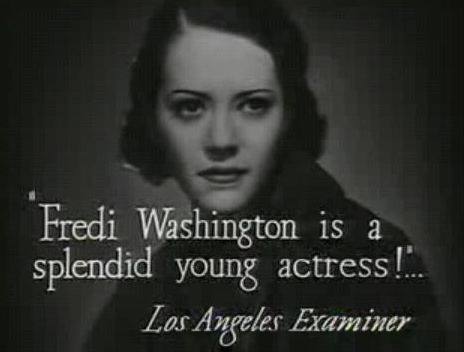
Fredericka Carolyn "Fredi" Washington (December 23, 1903 – June 28, 1994) was an American stage and film actress, civil rights activist, performer, and writer. Washington was of African American descent. She was one of the first Black Americans to gain recognition for film and stage work in the 1920s and 1930s. Washington was active in the Harlem Renaissance, her best known role being Peola in the 1934 film version of Imitation of Life, where she plays a young light-skinned Black woman who decides to pass as white. Her last film role was in One Mile from Heaven (1937), after which she left Hollywood and returned to New York to work in theatre and civil rights activism.
Fredi Washington was born in 1903 in Savannah, Georgia, to Robert T. Washington, a postal worker, and Harriet "Hattie" Walker Ward, a dancer. Both were of African American and European ancestry. Washington was the second of their five children. Her mother died when Fredi was 11 years old. As the oldest girl in her family, she helped raise her younger siblings, Isabel, Rosebud, and Robert, with the help of their grandmother. After their mother's death, Fredi and her sister Isabel were sent to the St. Elizabeth's Convent School for Colored Girls in Cornwells Heights, near Philadelphia, Pennsylvania.
While still in school in Philadelphia, Washington's family moved north to Harlem, New York. Washington graduated from Julia Richman High School in New York City.
Washington's entertainment career began in 1921 as a chorus girl in the Broadway musical Shuffle Along. She was hired by dancer Josephine Baker as a member of the "Happy Honeysuckles," a cabaret group. Baker became a friend and mentor to her. Washington's collaboration with Baker led to her being discovered by producer Lee Shubert. In 1926, she was recommended for a co-starring role on the Broadway stage with Paul Robeson in the play Black Boy. She quickly became a popular, featured dancer, and toured internationally with her dancing partner, Al Moiret.
Washington turned to acting in the late 1920s. Her first movie role was in Black and Tan (1929), in which she played a Cotton Club dancer who was dying. She acted in a small role in The Emperor Jones (1933) starring Robeson. In 1933, Washington married Lawrence Brown, the trombonist in Duke Ellington's jazz orchestra. That marriage ended in divorce. Washington also played Cab Calloway's love interest in the musical short Cab Calloway's Hi-De-Ho (1934).
Her best-known role was in the 1934 movie Imitation of Life. Washington played a young light-skinned Black woman who chose to pass as white to seek more opportunities in a society restricted by legal and social racial segregation. As Washington had visible European ancestry, the role was considered perfect for her, but it led to her being typecast by filmmakers. Moviegoers sometimes assumed from Washington's appearance—her blue-gray eyes, pale complexion, and light brown hair—that she might have passed in real life. In 1934, she said the role did not reflect her off-screen life, but "If I made Peola seem real enough to merit such statements, I consider such statements compliments and makes me feel I've done my job fairly well." She told reporters in 1949 that she identified as Black "...because I'm honest, firstly, and secondly, you don't have to be white to be good. I've spent most of my life trying to prove to those who think otherwise ... I am a Negro and I am proud of it."[7] Imitation of Life was nominated for an Academy Award for Best Picture, but it did not win. Years later, in 2007, Time magazine ranked it as among "The 25 Most Important Films on Race."
Washington's experiences in the film industry and theater led her to become a civil rights activist. In an effort to help other Black actors and actresses find more opportunities, in 1937 Washington co-founded the Negro Actors Guild of America, with Noble Sissle, W. C. Handy, Paul Robeson, and Ethel Waters. The organization's mission included speaking out against stereotyping and advocating for a wider range of roles. Washington served as the organization's first executive secretary. She was also heavily involved with the National Association for the Advancement of Colored People, widely known as the NAACP. While working with the NAACP, Fredi fought for more representation and better treatment of Black actors in Hollywood because she was one of the few Black actors in Hollywood who had some influence with white studio executives. Aside from working with those organizations to fight for the rights of Black actors, Washington also advocated for the federal protection of Black Americans and was a lobbyist for the Dyer Anti-Lynching Bill, which the NAACP supported.
Despite receiving critical acclaim, she was unable to find much work in the Hollywood of the 1930s and 1940s; Black actresses were expected to have dark skin, and were usually typecast as maids. Directors were concerned about casting a light-skinned Black actress in a romantic role with a white leading man; the film production code prohibited suggestions of miscegenation. Hollywood directors did not offer her any romantic roles. As one modern critic explained, Fredi Washington was "...too beautiful and not dark enough to play maids, but rather too light to act in all-Black movies..."
Washington was a theater writer, and the entertainment editor for The People's Voice (1942–1948), a newspaper for African Americans founded by Adam Clayton Powell Jr., a Baptist minister and politician in New York City who was married to her sister Isabel Washington Powell. She was outspoken about racism faced by African Americans and worked closely with Walter White, then president of the NAACP, to address pressing issues facing Black people in America.
In 1952, Washington married a Stamford dentist, Hugh Anthony Bell, and moved to Greenwich, Connecticut.
Fredi Washington Bell died, aged 90, on June 28, 1994. She died from pneumonia following a series of strokes at St. Joseph Medical Center in Stamford, Connecticut.
25 notes
·
View notes
Text
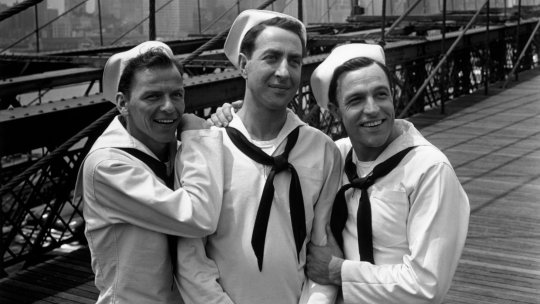
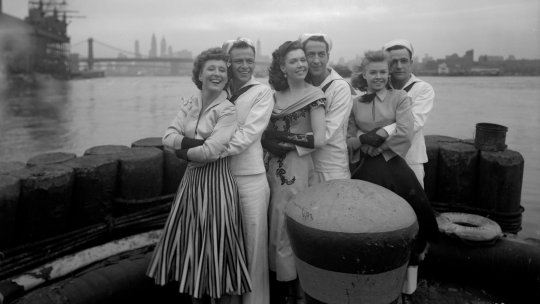
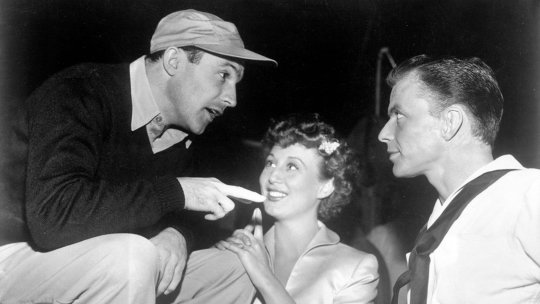
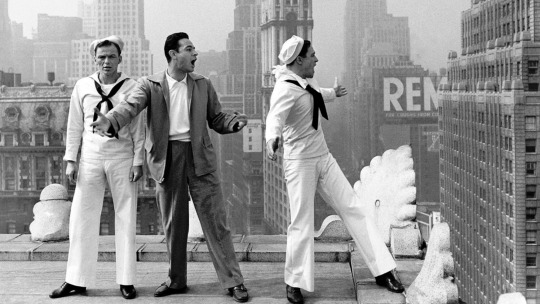
Celebrating the 75th anniversary of On the Town.
On the Town is a 1949 American film musical with music by Leonard Bernstein and Roger Edens and book and lyrics by Betty Comden and Adolph Green. It is an adaptation of the Broadway stage musical of the same name produced in 1944 (which itself is an adaptation of the Jerome Robbins ballet, titled Fancy Free, also produced in 1944.)
The film was directed by Gene Kelly (who also choreographed) and Stanley Donen, in their directorial debut, and stars Kelly, Frank Sinatra, Betty Garrett, and Ann Miller, featuring Jules Munshin and Vera-Ellen. It was a product of the Arthur Freed unit at Metro-Goldwyn-Mayer and is notable for its combination of studio and location filming, the result of Gene Kelly's insistence that some scenes be shot in New York City, including Columbus Circle, the Brooklyn Bridge, and Rockefeller Center.
The film was an immediate success and won the Oscar for Best Music – Scoring of a Musical Picture. It was also nominated for a Golden Globe Award for Best Cinematography (Color). Screenwriters Comden and Green won the Writers Guild of America Award for Best Written American Musical.
In 2006, the film ranked number 19 on the American Film Institute's list of Best Musicals. In 2018, the film was selected for preservation in the United States National Film Registry by the Library of Congress as being "culturally, historically, or aesthetically significant".
#on the town#leonard bernstein#roger edens#betty comden#adolph green#gene kelly#frank sinatra#jules munshin#betty garrett#ann miller#vera ellen#movie musical
5 notes
·
View notes
Text
'Hollywood Is on Strike Against High-Tech Exploitation' - by Alex N. Press
"LOS ANGELES — Before she appeared on HBO’s White House Plumbers and Fox’s New Girl, Stevie Nelson hosted a television show on Nickelodeon. On Crashletes, she and her cohosts, along with an audience of kids, reacted to viral videos of people failing at sports. The production ran for three seasons, wrapping at the end of 2020 with a total of sixty episodes.
Nelson worries that soon, a studio could use that body of work to train artificial intelligence (AI) to create a likeness of her to be used in perpetuity: a digital Stevie Nelson, doing things that she has never done, saying things that she has never said, yet indistinguishable from the real Stevie Nelson, based on her past on-screen work.
“There’s enough footage of me that they could technically have me host other shows for the rest of my life without ever having done it, and I’m sure I would not be fairly compensated for it,” said Nelson. “The idea of not a real person hosting shows is scary. The magic of acting, and of hosting, is its impromptu nature. I can’t imagine how soulless it all would be to replace it with AI.”
Nelson and I were speaking on Monday, July 17, a few feet from the picket line outside of Netflix’s corporate office in Los Angeles. She’s a member of the Screen Actors Guild–American Federation of Television and Radio Artists (SAG-AFTRA), one of 160,000 such members who were then on their second day of a nationwide strike. In walking out, the performers joined roughly 11,500 members of the Writers Guild of America (WGA), who have been on strike since May 2. The last such double strike was in 1960, when Ronald Reagan was SAG’s president.
Unlike less accessible studios in the Los Angeles area — the standout being NBC Universal, which currently lacks pedestrian walkways and shade thanks to studio machinations — Netflix is in the heart of Hollywood. On Monday, morale was high: hundreds of union members picketed while music that sampled news coverage of the strike blasted from stereos and union staff supplied workers with beverages, snacks, and sunscreen as the temperatures soared above 90 degrees.
Nelson’s fears that an avatar of herself will host television shows indefinitely in a digital purgatory might sound far-fetched, an idea more fit for a Black Mirror script than the real world, but such a possibility is central to what is now the largest strike in the United States. In negotiations with the Alliance of Motion Picture and Television Producers (AMPTP) for a new three-year TV/theatrical contract, SAG-AFTRA is seeking to regulate the use of AI to protect performers like her.
Writers want to regulate the usage of AI in their own negotiations with the studios, but the technology poses an even more immediate threat to performers. SAG-AFTRA proposed provisions that would require the studios to get informed consent from a performer before using her likeness and fairly compensate her for that use. They also offered proposals concerning the use of generative AI for training purposes.
The AMPTP didn’t agree. While the organization called its AI counterproposal “unprecedented,” SAG-AFTRA’s national executive director and chief negotiator Duncan Crabtree-Ireland characterized the studios’ offer as unacceptable.
“In this ‘groundbreaking’ AI proposal that they gave us yesterday, they proposed that our background performers should be able to be scanned, get one day’s pay, and their companies should own that scan, their image, their likeness, and should be able to use it for the rest of eternity on any project they want, with no consent and no compensation,” said Crabtree-Ireland at a press conference on Friday, July 15, announcing that the union’s board of directors had voted unanimously to call a strike. “If you think that’s a groundbreaking proposal, I suggest you think again.”
“The companies have responded to a number of the proposals we put on the table, but the problem is that the devil is in the details,” explained Crabtree-Ireland on The Town, a podcast about the entertainment industry. “We had reached some agreement on there being a requirement for consent but from our point of view, it has to be informed consent. Consent is not a boilerplate provision at the time you’re first hired on a project that says, ��The company can create a digital replica of you and use it for whatever purpose they want, forever.’”
[continue reading]
#sag-aftra strike#sag strike#ai#union solidarity#current events#actors strike#fans4wga#wga strong#wga strike#writers strike
29 notes
·
View notes
Text
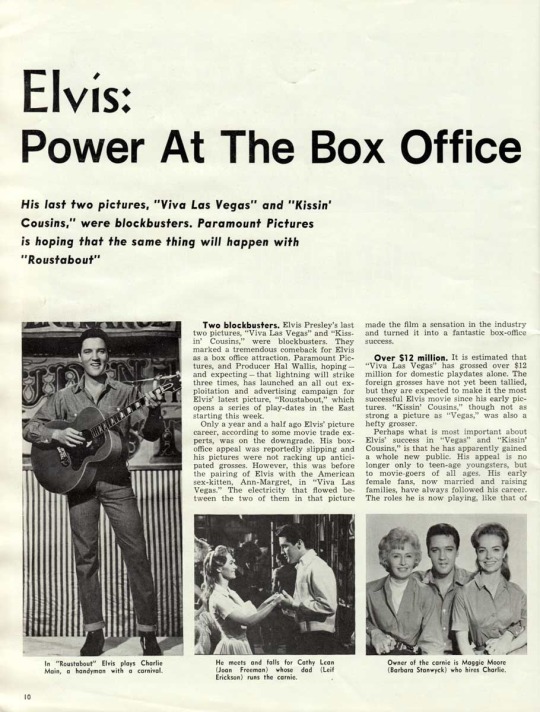
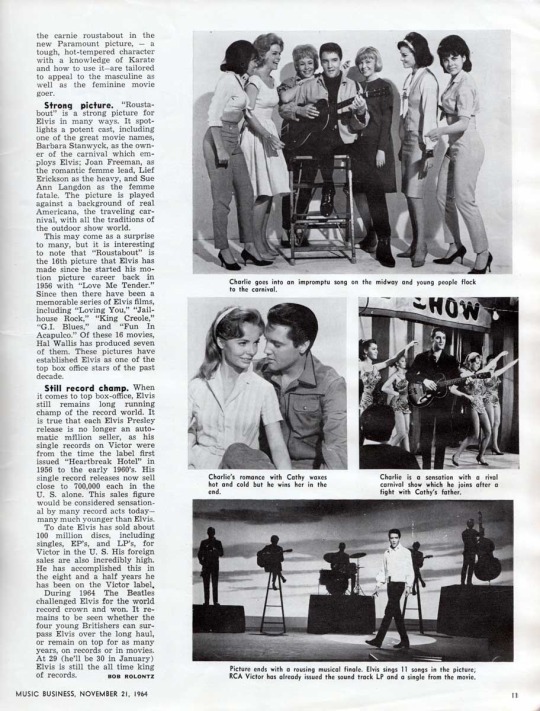
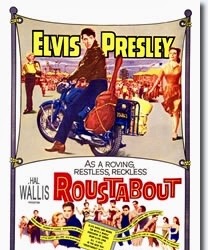


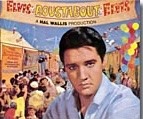
Elvis Presley Events In History Today The 21st November in 1964 Is Sixteenth Movie Was Premiered In Hollywood. Roustabout By Paramount.
Elvis Presley’s sixteenth movie was the 1964 Paramount film 'Roustabout'.
Playing opposite Barbara Stanwyck this time out in Roustabout, Elvis Presley was in awe of his costar and worked hard to live up to her professional standards. Unfortunately, the scriptwriters were less demanding of themselves, and the film suffers from banal dialogue and predictable plotting. Elvis Presley starred as Charlie Rogers, a drifter with a chip on his shoulder who lands a job as a roustabout, or handyman, with a down-and-out carnival operated by strong-willed Maggie Morgan, played by Stanwyck. When Charlie breaks into song on the midway one day, throngs of young people flock to hear him sing. As news of his talent spreads, Maggie's carnival begins to turn a tidy profit. Charlie's good fortune continues as Cathy, a beautiful young carnival worker played by Joan Freeman, takes a romantic interest in him. However, after a misunderstanding involving a customer's missing wallet, Maggie and Cathy chide Charlie for his selfish attitudes. The embittered young man quits Maggie's outfit to work for a rival carnival. When Maggie's carnival starts to go under, Charlie returns with enough money to ward off the creditors. His unselfish act wins Maggie's respect as well as Cathy's heart. Having at one time been a carnival worker, the idea for a picture with a carnival background had been that of Colonel Tom Parker, Elvis Presley’s manager. However, Colonel was adamant that the movie 'not cheapen carnival life....that this was a wholesome way of life in which the participants had a legitimate pride'.
The movie was first announced in May of 1961, but production was delayed until March of 1964. In the time between there were changes. Among them were: that the working title went from 'Right This Way Folks' to 'Roustabout'; that Elvis Presley’s character name changed from Charlie Main to Charlie Rogers; and that the character of carnival owner Maggie Moore changed to Maggie Morgan; and that the actress chosen to play Morgan changed from Mae West to Barbara Stanwyck. The writers were Anthony Lawrence and Allan Weiss.
Anthony Lawrence later worked on the scripts for the Elvis movies 'Paradise Hawaiian Style' and 'Easy Come, Easy Go' and the 1979 TV biopic 'Elvis', starring Kurt Russell in the title role. Among his other credits are a number of TV series including 'The Fugitive', 'Hawaii Five-O', 'Cannon', 'Quincy' and 'The Blue Knight'.
Allan Weiss was the screenwriter for the Elvis Presley’s flims 'Blue Hawaii', 'Girls! Girls! Girls!', 'Fun In Acapulco', 'Paradise Hawaiian Style' and 'Easy Come, Easy Go'. He once remarked that the scripts were written to producer Hal Wallis's specifications: 'Wallis kept the screenplays shallow'.
'I was asked to create a believable framework for twelve songs and lots of girls'. However true this was, both Mr. Lawrence and Mr. Weiss received a nomination from the Writers Guild of America in 1965 for their work on 'Roustabout' as the Best Written American Musical of 1964.
The director was John Rich and this was his first time to work with Elvis Presley He came from a strong background in TV, having directed such series as 'Our Miss Brooks', 'I Married Joan', 'Gunsmoke', 'The Rifleman', 'The Andy Griffith Show', 'The Dick Van Dyke Show' and 'Gilligan's Island'. He was anxious to break into film directing with Hal Wallis. He wasn't impressed with Elvis Presley’s Memphis Mafia entourage and their constant hanging around and playing practical jokes on one another. Elvis Presley told Mr. Rich, '...when these damn movies cease to be fun, I'll stop doing them. And if my guys go, (expletive), so do I'. Elvis Presley and Mr. Rich had gotten off to a shaky start when Elvis Presley cajoled the director into allowing him to do his own stunt fight, which was very uncommon then due to the possibility of the star's being hurt and shutting down production. When Elvis Presley indeed was hurt in the stunt and required several stitches above his eye, Mr. Rich was afraid to tell Hal Wallis that he'd allowed their star to become injured. Then he came up with a plan to write into the script the bandage that covered the stitches and thus production wasn't halted and Wallis was appeased. John Rich later directed Elvis in 'Easy Come, Easy Go'. By that time he was disillusioned with Hal Wallis and his methods and had developed a respect for Elvis Presley And No Big Star Had Ever Put Him Straight Like He Did When He Told If These Damn Movies Cease To Be Fun I’ll Stop Doing Them. He Really Admired And Respected Elvis Presley For Standing Up And Speaking Is Mind Although Parker Wasn’t Happy As He Pulled Elvis Presley Up Rich returned to directing TV series including such programs as 'All In The Family', 'Sanford and Son', 'Maude', 'The Jeffersons', 'Barney Miller', 'Newhart', 'Dear John' and 'Murphy Brown' among others. He has received many accolades including seven Emmy nominations with three Emmy wins.
On February 26, 1964, Elvis Presley reported to Paramount for pre-production. He started with soundtrack recording sessions at Radio Recorders of Hollywood. On March 3, Elvis Presley recorded the version of the title song 'Roustabout' that was written by Otis Blackwell and Winfield Scott. It was not used in the film. Instead they used a different song with the same title written by Bill Giant, Bernie Baum and Florence Kaye.
Elvis Presley recorded his vocals for that second song on April 29, 1964 after the principal photography was shot. An acetate of Elvis Presley’s long-thought-lost Blackwell/Scott song was found in Winfield Scott's basement and RCA first released it as a bonus track on the 2003 Elvis 2nd To None album. To differentiate it from the one used in the movie, the title was changed to 'I'm a Roustabout'.
Elvis Presley became frustrated during these sessions when he wanted The Jordanaires to back him up on a song that he would be seen singing alone in the film while riding a motorcycle down the road.
One of the producers questioned him as to where the backup singers would be in the shot.
Elvis Presley snapped back, 'The same damn place as the band!'
One of the songs in the film, 'It's A Wonderful World', written by Sid Tepper and Roy C. Bennett, was for a time in contention for an Academy Award nomination as Best Song.
For authenticity in Elvis Presley’s sixteenth film, 'Roustabout', a real carnival was employed and set up on land near Thousand Oaks, California. This was one of the locations used for exterior shots in the movie. The interior shots used three connecting sound stages (Nos. 12, 14 and 15) on the Paramount lot. The doors between them were opened up to make them into one huge stage, which was needed to accommodate the set for the big tent scenes. This was the first time in the history of the studio that they had done this.
15 notes
·
View notes
Text
July 13, 2023
By Anousha Sakoui
(Los Angeles Times) — SAG-AFTRA’s national board of directors on Thursday voted unanimously to approve a strike action by tens of thousands of Hollywood actors, widening the scope of labor unrest in an entertainment industry that is already facing numerous headwinds.
The vote came after negotiations between the actors’ union and the major studios failed to reach an agreement on a new film and TV contract.
Actors — similarly to screenwriters already on picket lines — have been battling studios for a pact that would deliver far better pay and residuals from streaming and address other issues, including the use of artificial intelligence, that have been roiling the entertainment landscape.
Despite the last-minute involvement of a federal mediator, the 160,000-member union was unable to secure a deal with the Alliance of Motion Picture and Television Producers, which represents studios in labor dealings. The old collective bargaining agreement expired Wednesday night without a deal in place.
Union leaders announced the board’s vote at a noon news conference in Los Angeles.
“What is happening to us is happening to all fields of labor,” SAG-AFTRA President Fran Drescher said during a fiery speech at the union’s headquarters. “I’m shocked by the way the people we have been in business with are treating us. It is disgusting. Shame on them.”
“We are the victims here,” Drescher added. “We are being victimized by a very greedy entity.”
So, some clarification. This strike covers all movie and TV projects that involve actors and voiceover announcers. This includes animated works. TL;DR: the main concerns are over residuals from streaming services (who are black holes of information that do not release viewership data so as to maintain complete leverage in contract negotiations) and the potential for AI. Unlike the writers, the actors are also trying to require all auditions to be in-person (one lasting impact of COVID is the larger adoption of taped auditions, which does not guarantee that the casting director watches the audition and also deprives the actor of networking opportunities even if they don't pass the audition). These concerns are almost identical - with exception of the in-person auditions - of the Writers Guild of America's (WGA) concerns with their respective strike.
This strike indirectly affects SAG-AFTRA members in radio, audiobooks, non-AMPTP studio video games and interactive media, music, and commercials.
This strike does not cover local news reporters and announcers for AMPTP constituent-owned radio and TV stations (full list here... e.g. every major local English- and Spanish-language channel in Greater LA and both PBS stations in KOCE and KCET). Yes, news reporters and announcers working for a stations owned by an AMPTP constituent are SAG-AFTRA members. They are covered by a separate contract.
#SAG-AFTRA#SAG AFTRA#WGA#AMPTP#labor#Netflix#Disney#Warner Bros.#Warner Bros. Discovery#Paramount#NBCUniversal#Sony#Amazon Prime#Apple#Apple TV+#Los Angeles#Hollywood#Los Angeles Times#breaking news#news
28 notes
·
View notes
Text
'There will be no fresh helpings of The White Lotus, The Last of Us or even Emily in Paris beaming into front rooms when summer fades. Nor will a screen version of the musical Wicked, starring Ariana Grande, be showing in your local cinema in the spring. And all shooting on Gladiator 2 in Morocco is likely to be indefinitely paused. Already, the wails are almost audible.
On this, the first weekend of the American screen actors’ strike, the level of frustration registered by film and TV drama fans around the world has dwarfed earlier reactions to the equivalent writers’ strike, running since the beginning of May.
Since negotiations collapsed in Los Angeles on Thursday, the gloves are off in a fight over the way the streaming services are seen to be pushing down pay and investing in the use of artificial intelligence in production.
And if an industrial relations struggle benefits from a dose of charisma, then the battle to secure the income of the talent behind a large proportion of the world’s streaming content suddenly has much more of the right ingredient. On Friday, George Clooney became the latest celebrity to back the campaign. “Actors and writers in large numbers have lost their ability to make a living,” the actor said, going on to speak of “an inflection point in our industry”.
The recognisability of many of the faces now taking a stand, from Clooney to Margot Robbie and Brian Cox, compared to their counterparts inside the writers’ rooms, has brought the Hollywood dispute to the top of the international news agenda. Productions involving leading American talent, stalled in many countries ever since work on scripts has been prohibited, will now probably grind to a near standstill. And the actors say they are prepared for a long fight.
Among them is Barbie star Robbie, who has stepped out of promotional events, and Oscar winner Susan Sarandon, who argued this weekend that “the issues of streaming and AI are things that have to be dealt with now”. “We’re in an old contract for a new type of business and it’s just not working for most people,” the actor told reporters in New York.
Sarandon’s words follow a protest move in London on Thursday when the stars of the new Christopher Nolan film, Oppenheimer, walked out of the premiere. Emily Blunt, Cillian Murphy and Florence Pugh left with Matt Damon, whose new production company with Ben Affleck is also set to suffer, he said. The cast had the support of the British director Nolan, who has spoken of the moment being ripe for action. Monday’s red carpet event ahead of the New York premiere of Nolan’s film is also cancelled. “In support of the ongoing SAG strike, the film-makers of Oppenheimer will instead screen the movie to celebrate the crew and craftspeople who contributed to making this film,” said a statement from Universal.
Festivals and fan events are threatened too. Organisers of the Toronto International film festival still hope it will go ahead in early September and have told the BBC: “The impact of this strike on the industry and events like ours cannot be denied. We urge our partners and colleagues to resume an open dialogue.” The Venice festival schedulednext month is also in jeopardy, and San Diego’s Comic-Con could be held without its main attraction – celebrities.
On Friday, more than 160,000 members of the Screen Actors Guild-American Federation of Television and Radio Artists (Sag-Aftra) stopped work, joining the 11,500 members of the Writers Guild of America in the biggest strike for more than 60 years. Both writers and actors were negotiating with the Alliance of Motion Picture and Television Producers over residuals, the payments made when a show or film is repeated. Streaming services such as Netflix have large audiences because of their big libraries of films and shows and yet they pay much less in residuals than broadcast television.
Actor Fran Drescher, the serving president of Sag-Aftra known for her role in The Nanny, claims responses from studio and streaming bosses so far have been “insulting and disrespectful”.
Her sentiments have been echoed by Cox, the Scottish actor behind Succession’s ruthless Logan Roy. “If our residuals go down, it means our health insurance isn’t going to be met,” he said on Friday. “The streaming services have shot themselves in the foot because they’ve said, ‘We’re going very well on this front.’ And when we called them to task and said, ‘What about our residuals, what about our money?’ everything kind of closes down and … you know, it’s not going to happen.”
Cox also attacked plans to use AI programming to replicate talent. “There would never be an original voice,” he argued, citing the British writer behind Succession, Jesse Armstrong, and Mike White, the creator and sole writer of The White Lotus. “It would be some kind of copy monkey of the show. And that is unacceptable.”
If screen talent is now playing its part to the full, then the tough-talking industry moguls are also getting into character. On Thursday, ahead of the strike, Walt Disney CEO Bob Iger told CNBC that stoppages had come at “the worst time in the world”. “There’s a level of expectation that they have that is just not realistic, and they are adding to a set of challenges that this business is already facing, that is quite frankly, very disruptive,” he said.'
#The White Lotus#The Last of Us#Emily in Paris#Bob Iger#Wicked#Gladiator 2#Succession#George Clooney#Margot Robbie#Barbie#Brian Cox#Fran Drescher#SAG-AFTRA#Susan Sarandon#Cillian Murphy#Florence Pugh#Emily Blunt#Matt Damon#Robert Downey Jr.#Oppenheimer#Christopher Nolan
3 notes
·
View notes
Text


















Arrivals & Departures . 24 April 1942 . Barbara Joan Barbra Streisand
Barbara Joan "Barbra" Streisand born is an American singer, actress, songwriter, producer, and director. With a career spanning over six decades, she has achieved success across multiple fields of entertainment, being the first performer awarded Emmy, Grammy, Oscar, and Tony awards.
Streisand's career began in the early 1960s performing in nightclubs and Broadway theaters. Following guest appearances on various television shows, she signed to Columbia Records—retaining full artistic control in exchange for accepting lower pay, an arrangement that continued throughout her career. Her studio debut, The Barbra Streisand Album (1963), won the Grammy Award for Album of the Year. Throughout her recording career, Streisand has amassed a total of 31 RIAA platinum-certified albums, including People (1964), The Way We Were (1974), Guilty (1980), The Broadway Album (1985) and Higher Ground (1997). She was the first woman to score 11 number-one albums on the US Billboard 200—from People to Encore: Movie Partners Sing Broadway (2016)—and remains the only artist to top the chart in six decades Streisand also topped the US Billboard Hot 100 with five singles: "The Way We Were", "Evergreen", "You Don't Bring Me Flowers", "No More Tears (Enough Is Enough)", and "Woman in Love".
Following her established recording success, Streisand ventured into film by the end of the 1960s. She starred in the critically acclaimed Funny Girl (1968), winning the Academy Award for Best Actress. Additional fame on the big screen followed with the extravagant musical Hello, Dolly! (1969), the screwball comedy What's Up, Doc? (1972), and the romantic drama The Way We Were (1973). Streisand won the Academy Award for Best Original Song for writing the love theme from A Star Is Born (1976), the first woman to be honored as a composer. With the release of Yentl (1983), Streisand became the first woman to write, produce, direct, and star in a major studio film. The film won an Oscar for Best Original Score and a Golden Globe for Best Motion Picture Musical. Streisand also received the Golden Globe Award for Best Director, becoming the first (and for 37 years, the only) woman to win that award. Streisand later produced and directed The Prince of Tides (1991), and The Mirror Has Two Faces (1996).
With sales exceeding 150 million records worldwide, Streisand is one of the best-selling recording artists of all time. According to the Recording Industry Association of America (RIAA), she is the second-highest certified female artist in the United States, with 68.5 million certified album units. Billboard ranked Streisand as the greatest solo artist on the Billboard 200 chart and the top Adult Contemporary female artist of all time. Her accolades span ten Grammy Awards, including the Grammy Lifetime Achievement Award and the Grammy Legend Award; nine Golden Globe Awards; five Emmy Awards; four Peabody Awards; two Academy Awards; the Screen Actors Guild Life Achievement Award; and the Presidential Medal of Freedom.
0 notes
Text
Maria and the Captain dance the Laendler from The Sound of Music (Official HD Video)
youtube
12,622,397 views Dec 11, 2013 "Maria and the Captain dance the Laendler" from the 1965 film of THE SOUND OF MUSIC.
Shop THE SOUND OF MUSIC Super Deluxe Edition, featured in a variety of formats, including a Super Deluxe Edition (4-CD/1-Blu-Ray Audio box set and digital). Order now: https://found.ee/som-superdeluxe
CONNECT WITH THE SOUND OF MUSIC:
ABOUT THE SOUND OF MUSIC Produced and directed by Robert Wise, and starring Julie Andrews and Christopher Plummer, with Richard Haydn and Eleanor Parker. The film is an adaptation of the 1959 Broadway musical of the same name, composed by Richard Rodgers with lyrics by Oscar Hammerstein II.
The film's screenplay was written by Ernest Lehman, adapted from the stage musical's book by Lindsay and Crouse. Based on the memoir The Story of the Trapp Family Singers by Maria von Trapp, the film is about a young Austrian woman studying to become a nun in Salzburg in 1938 who is sent to the villa of a retired naval officer and widower to be governess to his seven children.
After bringing and teaching love and music into the lives of the family through kindness and patience, she marries the officer and together with the children they find a way to survive the loss of their homeland through courage and faith. The film was released on March 2, 1965 in the United States, initially as a limited roadshow theatrical release. Although critical response to the film was widely mixed, the film was a major commercial success, becoming the number one box office movie after four weeks, and the highest-grossing film of 1965.
By November 1966, The Sound of Music had become the highest-grossing film of all-time—surpassing Gone with the Wind—and held that distinction for five years.
The film was just as popular throughout the world, breaking previous box-office records in twenty-nine countries. Following an initial theatrical release that lasted four and a half years, and two successful re-releases, the film sold 283 million admissions worldwide and earned a total worldwide gross of $286,000,000. The Sound of Music received five Academy Awards, including Best Picture and Best Director.
The film also received two Golden Globe Awards, for Best Motion Picture and Best Actress, the Directors Guild of America Award for Outstanding Directorial Achievement, and the Writers Guild of America Award for Best Written American Musical.
In 1998, the American Film Institute (AFI) listed The Sound of Music as the fifty-fifth greatest American movie of all time, and the fourth greatest movie musical. In 2001, the United States Library of Congress selected the film for preservation in the National Film Registry, finding it "culturally, historically, or aesthetically significant". ABOUT RODGERS & HAMMERSTEIN After long and highly distinguished careers with other collaborators, Richard Rodgers (Composer, 1902-1979) and Oscar Hammerstein II (Librettist/Lyricist, 1895-1960) joined forces in 1943 to create the most successful partnership in American musical theater. Prior to joining forces, Rodgers collaborated with lyricist Lorenz Hart on musical comedies that epitomized wit and sophistication (Pal Joey, On Your Toes, Babes In Arms and more), while Hammerstein brought new life to operetta and created the classic Show Boat with Jerome Kern. Oklahoma!, the first Rodgers & Hammerstein musical, introduced an integrated form that became known as “the musical play.” Their shows that followed included Carousel, South Pacific, The King and I, and The Sound of Music. Collectively, the Rodgers & Hammerstein musicals have earned Tony, Oscar, Grammy, Emmy, Pulitzer, and Olivier Awards. The Rodgers & Hammerstein Organization is a Concord Company, www.concord.com.
#TheSoundofMusic#JulieAndrews#RodgersAndHammerstein#Broadway#Theater#Theatre#RichardRodgers#OscarHammerstein#Rodgers#Hammerstein#Youtube
1 note
·
View note
Text
The Writers Guild of America (WGA) is striking against studios in pursuit of a new contract that lets writers participate more fully in the industry. The central disagreements are about economics, but the issue that has captured the most public attention is the threat posed by so-called artificial intelligence—products like ChatGPT—to the livelihood of creative professionals, including writers.
ChatGPT is a generative AI program that has been trained on a massive corpus of text to predict the word or words that should follow a text prompt or word string. It is not intelligent, though its user interface has been designed to create that illusion.
Studios perceive that generative AI is a tool they can use against writers. Some kinds of programming can be formulaic—awards shows and sitcoms, for example—which encourages writers to mimic scripts that have been successful in the past. In theory, a well-constructed generative AI could provide a first draft of such a script. But studio executives have gone one step further, imagining that products like ChatGPT will transform the writing process for everything from awards shows to feature films. Studios see this as both a potential cost savings and a way to convert script writing from copyrightable work to work for hire.
It is almost certain that they will embrace generative AI, even if it produces nothing but junk, which is what they will get. They have drunk the Kool-Aid poured by Silicon Valley’s hype merchants.
My experience working in Hollywood—as a consultant on Silicon Valley for five seasons and through involvement in documentaries like The Facebook Dilemma, The Social Dilemma, and The Great Hack—has led me to believe that if studios are smart, they will understand that their interests are aligned with those of writers, directors, and all creative people. Silicon Valley is coming for their profit margin.
CEOs believe that generative AI will reduce their labor costs. What they are missing is that Silicon Valley plans to use AI to do to Hollywood what it did to news and music. Silicon Valley’s bait-and-switch tactics follow a pattern that Cory Doctorow, writing about social media, refers to as “enshittification.” Social media platforms offer benefits to users until they are hooked, then they “enshittify” the product to appeal to advertisers. Once advertisers are on board, platforms “enshittify” their experience, as well as that of users, to extract maximum value. They perfected the game plan at Facebook, YouTube, Instagram, Twitter, SnapChat, and TikTok and are now extending it outside of social media.
We see this in video streaming technology, the first step in a siege against Hollywood. As Big Tech always does, it baited the trap with short-term benefits, such as an increased investment in programming, which emerged in the form of a golden age of high-quality, limited run series. Streaming caused an explosion in the number of shows, but each show had many fewer episodes, which meant writers would only be employed for eight or 10 weeks at a time. In addition, streaming undercut television syndication, which had been a big source of income for writers. Streaming’s touted benefits have eroded rapidly over the past two years as studios have entered the streaming market, saturating consumer demand and forcing all involved to cut costs.
Now, generative AI is the potential kill shot, the one that could cause copyright owners to surrender their library of scripts, created over decades, in exchange for promised benefits that will never arrive.
When it comes to generative AI and video, Silicon Valley only needs to hook one constituency— Hollywood executives. Once studios buy in, they will be at the mercy of the purveyors of that technology. It happened in journalism. It happened in music. Silicon Valley did not kill those industries, but it gained control of the audience and extracted a huge percentage of the potential profits. For studio executives, generative AI is an intelligence test.
The best path forward is for studios and writers to acknowledge four realities.
First, generative AI will eventually be a valuable tool in some creative realms, potentially including script writing, but only if the AI has been built from the ground up for that task.
Second, the flaws of today’s generative AIs make them unsuitable for serious work, especially in creative fields. General purpose AIs, like ChatGPT, are trained on whatever content the creator can steal on the internet, which means their output often consists of nonsense dressed up to appear authoritative. The best they can do is imitate their training set. These AIs will never be any good at creating draft scripts—even of the most formulaic programming—unless their training set includes a giant library of Hollywood scripts.
Third, Silicon Valley is the common enemy of studios and writers. It is an illusion that studios can partner with AI companies to squeeze writers without being harmed themselves. Silicon Valley is using a potential reduction in writer compensation as the bait in a trap where the target is studio profits.
Fourth, there is no reason Hollywood cannot create its own generative AI to compete with ChatGPT. Studios and writers control the intellectual property needed to make a great AI. A generative AI that is trained on every script contributed by a single studio or collection of studios would produce wildly better scripts than ChatGPT. Would it produce the next Casablanca? No. But it could produce an excellent first draft of an Emmy Awards show script. And it would safeguard the business model of Hollywood for the next generation.
If studios work separately or together to create AI they control, the future of Hollywood will be much brighter. Central to this fourth point is a legal strategy of copyright infringement litigation against the major players in generative AI. If copyright is to mean anything at all, Hollywood must challenge Silicon Valley’s assertion of the right to “permissionless innovation,” which has become a safe harbor for law-breaking in domains ranging from consumer safety to public health to copyright.
Some might say that Hollywood does not have the ability to “do technology.” That is ridiculous. Pixar, Weta Digital, and the CGI special effects industry demonstrate that Hollywood can not only master technology, but also innovate in it.
There are many open source architectures for generative AI. Studios and the WGA can license them cheaply and hire a handful of engineers to train their own AI. It will take many years, but copyright litigation will buy the industry the time it needs, and it may even become a giant profit center.
There are serious issues to be resolved between the writers and studios. AI is part of the negotiation, but it is substantively different from the other issues on the table. The tech industry wants to use generative AI to extract profits from film and television, just as it has done in other categories of media. The question is whether studios will repeat the mistakes of journalism and music.
3 notes
·
View notes
Text

Tracey Elaine Edmonds (McQuarn; February 18, 1967) is a businesswoman, television producer, and personality. She is the CEO of Edmonds Entertainment Group Inc. and Alrightnow.com and is a former host of the television show Extra. She sits on the national board of directors for the Producers Guild of America.
She has created and produced projects for television, film, music, and digital media. In 2014, she joined Extra and left the company in 2017. While at Extra, she earned an Emmy Award for co-hosting. She currently serves as CEO and President of Edmonds Entertainment. In 2013, she founded Alright TV, a family- and faith-oriented Web network. She produced Games People Play (BET).
She married Kenneth “Babyface” Edmonds (1992–2005), and she has two sons. #africanhistory365 #africanexcellence
0 notes
Text
Rooty Toot Toot - 1951, Dir. Jon Hubley
As I discussed in my previous post examining the interviews by Don Peri with Frank Thomas and Ollie Johnston, during the 1940's the Walt Disney Productions studio underwent a serious restructuring of goals and methods of animation. Following a contentious change in direction from a studio that was largely concerned with creating new kinds of entertainment through artistic experimentation, Disney began to focus more on consistently producing a more refined, realistic style of animation that would supposedly be more accessible to the average viewer. This coincided with the 1941 Disney Animator's strike, which by and large was concerned with uneven pay and practices at the studio which was a non-unionized workplace (although this was contested by Thomas and Johnston who believed there to be communistic ideals behind the strike). In retaliation to this strike (in addition to more underhanded tactics like allegedly hiring goons to break up picket lines and testifying against strikers in anti-communist hearings) Disney fired many of the animators, and although he was eventually pressured into allowing some of them to return by the Screen Cartoonist's Guild, others were disillusioned with the studio and instead left to pursue their own projects. The most notable of these is likely the highly influential independent studio known as the United Productions of America, or simply UPA.

UPA logo, Alvin Lustig, 1947
UPA became known for its extremely stylized, exaggerated and sparse style. Intentionally stepping away from the standard "funny animal" characters that were at that time very common in animation, especially in Disney productions, UPA often instead focused on caricatures of humans that could be animated relatively quickly and cheaply in its limited animation style, similarly to another one of my previous posts, The Dover Boys. Although they were producing shorts as early as 1944, the studio's main animated successes were the series based around Mr. Magoo, a short-sighted elderly curmudgeon who repeatedly avoids certain death by sheer luck, and the popular theatrical short Gerald McBoing-Boing, a young boy who can only communicate in sound effects, the original story of which the short was based upon being written by Theodor Geisel, better known as Dr. Seuss.
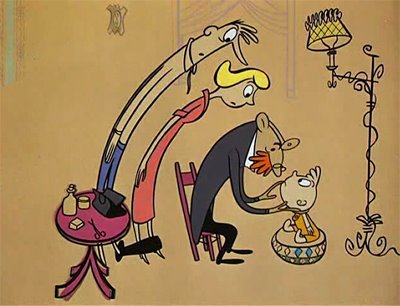
A screenshot of Gerald McBoing-Boing, featuring UPA's stylized human characters and sparse background art.
John Hubley, although not a founder of UPA, was one of its earliest employees and like many others of his ilk, was a former Disney artist who, while supposedly one of the better paid of the strikers, still felt limited by the artistic restrictions of Disney's mandates for realism. Despite the successes the studio had experienced so far, there allegedly existed a fair bit of animosity between the key artists working in UPA. Gerald McBoing-Boing won the studio an Academy award, and Hubley was eager to create a film that was equally influential. This led to the creation of UPA's most expensive and artistically ambitious cartoon yet, 1951's Rooty Toot Toot.
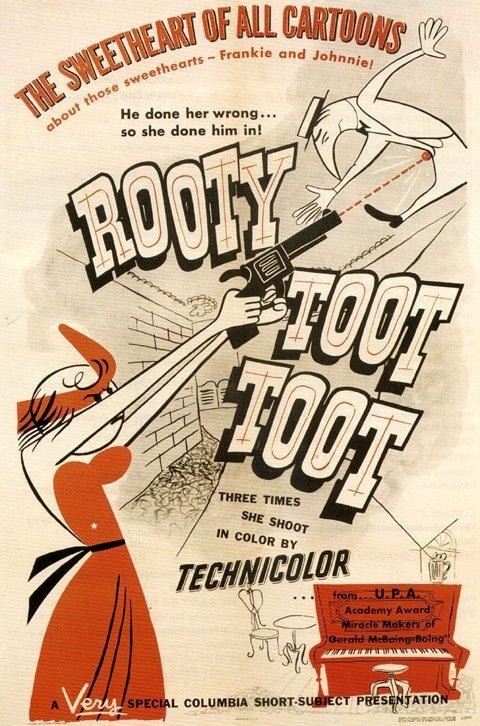
Poster for Rooty Toot Toot.
The short exudes a film noire vibe, its story being a retelling of a now over a century-old tune, Frankie and Johnny. A classic American murder ballad, the song details the murder of an unfaithful pianist by his jilted lover, and the film follows the song very faithfully. The story is presented as a musical courtroom drama, with the testimony of witnesses during the trial of Frankie as flashbacks to the events of the murder. Rooty Toot Toot is notable in animation for the time for the use of adult themes such as sex, violence, corruption, infidelity and ultimately, murder. Although these concepts were not unknown to the animation scene at this point (Fleischer cartoons, for example, often featured some of these concepts) it was still considered quite shocking for the time and as a result, Rooty Toot Toot was withheld from TV syndication for many years.
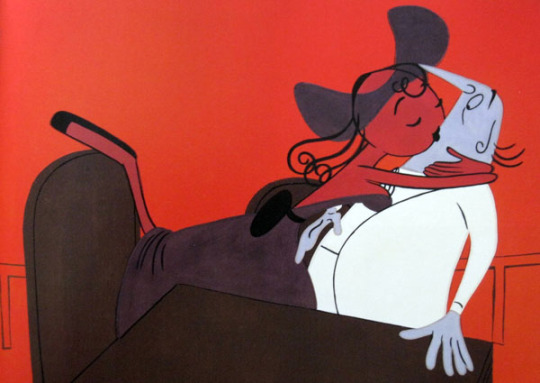
A screenshot of Rooty Toot Toot, featuring the short's highly exaggerated style and use of colour.
What really strikes me upon watching the short, however, is its unique art style. Even by UPA standards, Rooty Toot Toot is unique and experimental. Animated by, among others, Art Babbitt, the original creator of Goofy, and Grim Natwick, animator on Betty Boop for the Fleischer Brothers, the film oozes a Jazzy personality that really adds to the darkly comedic tone. Great care has been given to help establish personality through animation acting in almost every scene. Characters pirouette through their choreography in ballet-like motions (referenced, but not rotoscoped, from poses by dancer Olga Lunick), the put-upon bartender hunches with the weight of the cruel world on his shoulders, Frankie's sweet expressions are quickly replaced by barely-contained fury.

The backgrounds, made by Paul Julian, were created by taking a corroded gelatin roller to produced the distressed look of the dingy, sleazy setting. One thing that strikes me as particularly interesting; characters are often portrayed as "transparent", the bright colours of their garments or the background bleeding through their limbs in an almost cubist or modernist style. The linework is simplistic but clean and clear, and the strong posing really helps characterize the less-than-moral personalities of the story. I think overall it is not unreasonable to say that Rooty Toot Toot was the artistic peak of UPA's catalogue.
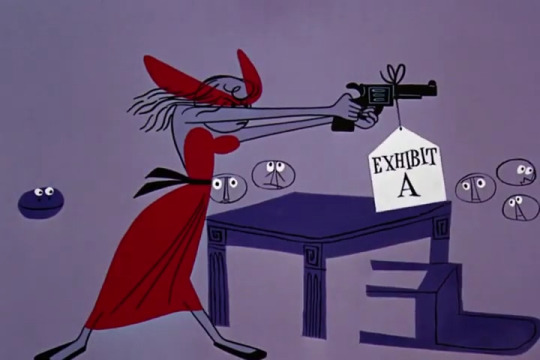
Frankie shooting down her attorney.
Unfortunately, not unlike Fantasia, Disney's own ambitious artistry-driven film, Rooty Toot Toot was not the smash success that Hubley had hoped for. Although it did receive an Academy award nomination, it would lose out to The Two Mouseketeers, a Tom and Jerry short. Worse still, not long after its release, the House Committee on Un-American Activities was informed that many of the artists working at UPA were communist sympathizers. Columbia sent a letter to UPA threatening to end the studio's distribution unless the named artists, including John Hubley, publicly denounced communism, and upon his refusal, Hubley was fired from UPA. From that point on the studio floundered and its artistic ambitions, despite its original attempt to distance itself from Disney, ultimately winnowed in the same way Disney's had after the failure of Fantasia.
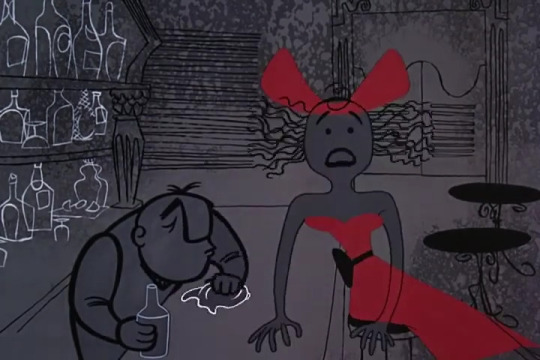
Today, the short is widely acclaimed as one of the most important pieces of independent animation from an American studio ever made. It was voted as one of the 50 Greatest Cartoons of All Time by industry professionals in 1994, and it is still used as a point of reference for animators for posing and personality. Even now, younger generations of artists are still taking inspiration from this extremely unique and engaging piece, over 80 years later.

References:
http://amodernist.blogspot.com/2012/06/rooty-toot-toot-1951.html
https://www.skwigly.co.uk/100-greatest-animated-shorts-rooty-toot-toot-john-hubley/
https://reedart.wordpress.com/2020/03/25/rooty-toot-toot-1951-upa-studios/
https://www.beyondeasy.net/2017/04/animation-april-rooty-toot-toot-1951.html
0 notes
Video
youtube
Tony Awards Flashback
Ariana DeBose hosts the 76th Annual TONY AWARDS
“I'm live and unscripted. You're welcome. So, to anyone who may have thought that last year was a bit unhinged, to them, I say, ‘Darlings, buckle up.’” —76th Tony Awards host Ariana DeBose during her opening monologue
On May 2, 2023, the Writers Guild of America (WGA) went on strike against the Alliance of Motion Picture and Television Producers. On May 12, the WGA denied the American Theatre Wing's request for a waiver to allow the CBS telecast, thereby placing the ceremony's broadcast in uncertainty.
The Tonys ceremony ultimately went on unscripted. Before the show began, host Ariana DeBose revealed to the audience the only words that would appear on the teleprompter that night: "Please wrap up" (the advisory to award winners to close their acceptance speech). The broadcast began with DeBose paging through a script of blank pages before launching into the opening number, choreographed by Karla Puno Garcia, that was completely dance and music driven for the first time in history.
0 notes
Text
Over the Horizon
read it on AO3 at https://ift.tt/tOsQnRv by Starillusion Utopia: Quest for Freedom is the hottest MMORPG on the market. The number one guild in the game, Astra Noctis is thought to be a group of hardcore players bent on being the best. As it turns out, they're really just a group of idiots enjoying the game, but yes, they do want to be the best. Hongjoong works hard as a music producer, and Utopia is his stress relief. It helps that he has grown so close to one particular member known only to him as Toothless. The crush is all encompassing at times, but Hongjoong does his best to ignore it. He is sure he can keep it under wraps... but then they all start talking about meeting up in real life at Utopia's upcoming game convention. The thought of meeting Toothless in person fills Hongjoong with a mix of excitement and anxiety. Will the reality match his expectations? Or will he find himself acting like a fool, lost for words in Toothless's presence? The potential for awkwardness only adds to the anticipation of the meeting. Words: 2618, Chapters: 1/?, Language: English Fandoms: ATEEZ (Band), Stray Kids (Band) Rating: Explicit Warnings: Creator Chose Not To Use Archive Warnings Categories: M/M Characters: ATEEZ Ensemble, Stray Kids Ensemble Relationships: Kim Hongjoong/Park Seonghwa Additional Tags: MMORPG setting, Made Up Game, Real Life, They're all in America for reasons, Cause the author is more familiar with America, And for travel reasons - need more travel room, Video Game Mechanics, Lots of game mechanics mentioned, Lots of game lingo, Author made a whole MMO here, The Author Regrets Nothing, Friendship, Team Bonding, Guild friends, Online Friends, Real life friends - Freeform, some tension, some jealousy, Kim Hongjoong is Whipped, Kim Hongjoong is crushing!, Top Kim Hongjoong, Bottom Park Seonghwa, Seonghwa is just so sweet, Seonghwa is mother!, of 13 freaking kids now, Minor relationships in the background, yungi, Woosan, Others too that I'm just not mentioning in tags, Guild dynamics, Online Relationships, meeting irl, Fluff, Fluff and Smut, Fluff and Humor, Tooth-Rotting Fluff, Romantic Fluff, Light Angst, maybe more who knows, Mostly fluff and friendship and happiness, Lighthearted, oh and smut too, Eventual Smut, Eventual Romance, Anal Sex, Everyone Is Gay, Deal with it!, Teasing, Other Additional Tags to Be Added, Tags Are Hard read it on AO3 at https://ift.tt/tOsQnRv
0 notes